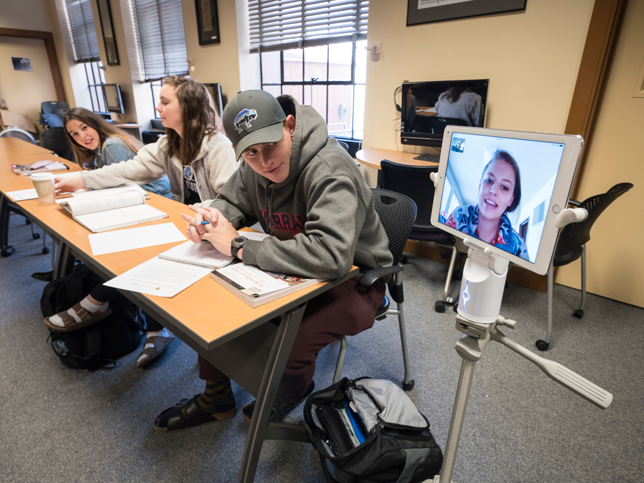'Remote Presence' Tech Lets U Colorado Boulder Students Attend Class from Afar
- By Dian Schaffhauser
- 10/31/18

Kubi brings remote students in on class action when they can't be there in person. (Photo: Glenn Asakawa/University of Colorado Boulder)
The University of Colorado Boulder has formally introduced a "remote presence" technology to enable students who can't be physically present in a course to attend remotely. Kubi is a robotic neck that holds a tablet and is controllable by the remote user to allow him or her to look around the room through a Zoom videoconference meeting. The tablet, through which the remote student can see, hear and speak with others in the room, can be moved 320 degrees side to side and 90 degrees up and down.
Use of Kubi at the university began with a small pilot in spring 2016, when a lone student was brought into an Italian language class for a semester. The Academic Technology Design Team (ATDT) found that Kubi allowed the student to attend 95 percent of the classes "without disrupting the learning experience for face-to-face students." It also had other positive effects, such as letting the remote student interact with those in the classroom. Based on the success of that effort, the design team pitched a project to expand the testing through an innovation grant issued by the Office of Senior Vice Chancellor and CFO, which solicited creative approaches to solving campus challenges.
In spring 2017 ATDT worked with various units to test Kubi's use for students who couldn't be on campus for several reasons: due to medical challenges; for athletes who had to be away from campus for competition or training; and for students who had left Boulder before finishing their degrees only a few credits short of graduating. During the pilot, ATDT found that 11 students were able to attend 302 class sessions "they otherwise would have missed." Additional uses also surfaced, including enabling administrators, staff and faculty to participate in on-campus meetings, even when they were away. Based on the results of the pilot, the team recommended that the university continue to offer Kubi devices "as a stop gap solution for students in need, allowing them to continue their studies without interruption and complete their degree."
Now CU Boulder has set up an official Kubi service and made it available to students for a variety of circumstances that would benefit from remote attendance. All students need to do is log in to fill out a form and request a Kubi.
To make it work, as an article for Educause by three members of the team explained, word about availability of the service needs to make it out to anybody who could take advantage. Also, on the technical front, Kubi relies on a "strong WiFi or high-speed internet connection in the remote student's environment." And the tablet needs to have sufficient audio and video capabilities. The team also noted that training for the remote students in how to control the device beforehand was "essential"; and classmates need to be reminded to "treat the telepresence setup as a student in a physical classroom." Now, a Kubi service manager has been assigned to coordinate those activities.
"What started as a short-term technology pilot has expanded to an ongoing service at CU Boulder," the article stated. "The implementation of telepresence robotics on our campus both supplements existing student support services and reflects CU Boulder's commitment to helping students in need."
The business that introduced Kubi into education, Revolve Robotics, has ceased operating. However, its primary investor and Kubi manufacturer, Xandex, continues to accept orders and provide support. For more information, visit the Kubi website.
About the Author
Dian Schaffhauser is a former senior contributing editor for 1105 Media's education publications THE Journal, Campus Technology and Spaces4Learning.